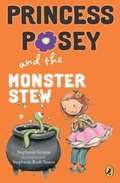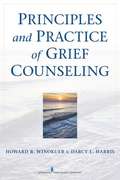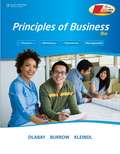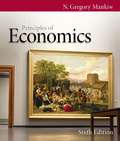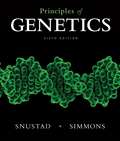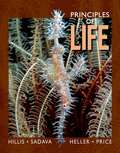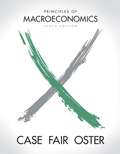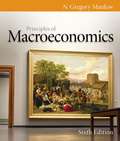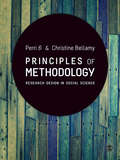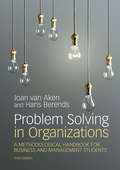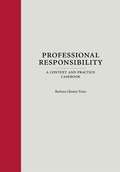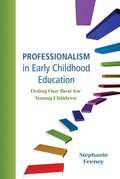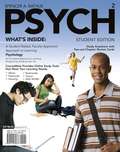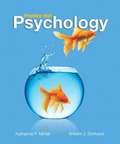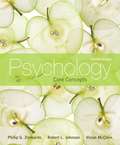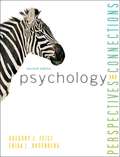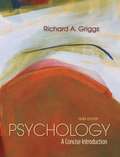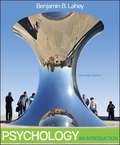- Table View
- List View
Princess Posey: Monster Stew
by Stephanie GreeneHalloween frights are no match for Princess Posey and her tutu Posey loves Halloween. But after Miss Lee announces that the first grade class will be eating Monster Stew, Posey gets worried. Luckily, her tutu turns her into Princess Posey, the girl who can tackle any problem! She finds out what "lizard livers" and "monster eyeballs" really are, and her new neighbor has just the right thing to light up Halloween night. .
Principles and Practice of Grief Counseling
by Howard R. Winokuer Darcy L. HarrisThis core, introductory textbook for undergraduate and graduate level courses is the first volume to combine the knowledge and skills of counseling psychology with current theory and research in grief and bereavement. It is grounded in the belief that grief counseling is distinct from other therapeutic issues because grief is an adaptive response rather than a form of pathology. The book describes the unique aspects of grief as a normal response to loss, and views the goal of counseling bereaved individuals as one of facilitating the unfolding of the healthy and adaptive aspects of the process as it manifests itself within each client. Grief is considered a response to losses that are both death- and non-death-related; and psychological, physical, social, economical and practical experiences of grief are addressed. The text introduces various theories of bereavement and examines different therapeutic modalities that can be used in the context of grief and loss. Specific counseling practices that facilitate successful interventions are discussed, particularly that of "presence," considered by the authors to be the primary therapeutic stance when working with bereaved individuals. The text also addresses grief counseling with special populations, ethical issues, and self-care concerns for counselors. Case studies, discussion and reflection questions, and suggested additional resources are included in each chapter.
Principles of Business
by Les R. Dlabay James L. Burrow Brad A. KleindlPRINCIPLES OF BUSINESS, Eighth Edition, prepares students for the real world of business with complete coverage of finance, marketing, operations, and management.
Principles of Economics, Sixth Edition
by N. Gregory MankiwWith its clear and engaging writing style, Principles of Economics (Sixth Edition) continues to be one of the most popular books on economics available today. Mankiw emphasizes material that you are likely to find interesting about the economy (particularly if you are studying economics for the first time), including real-life scenarios, useful facts, and the many ways economic concepts play a role in the decisions you make every day.
Principles of Genetics (Sixth Edition)
by D. Peter Snustad Michael J. SimmonsSnustad's 6th edition of Principles of Genetics offers many new and advanced features including boxed sections with the latest advances in Genetics, a streamlined roster of topics, a more reader-friendly layout, and new problem-solving supplements. Furthermore, this new edition includes more problem solving within each chapter through the Test Your Problem Solving Skills feature and a Solve It icon to prompt readers to go online to WileyPlus for animated tutorials. A new one-column design better showcases important pieces of art and avoids the "overwhelmed" reaction readers have to the crowded layouts found in many other texts. Boxed sections reduce in size to help maintain the flow of the text and the Focus On boxes are revised to include the most current developments in genetics as well as most relevant topics.
Principles of Life
by David M. Hillis David Sadava H. Craig Heller Mary V. PriceFor sample chapters, a video interview with David Hillis, and more information, visitwww. whfreeman. com/hillispreview. Sinauer Associates and W. H. Freeman are proud to introducePrinciples of Life. Written in the spirit of the reform movement that is reinvigorating the introductory majors course,Principles of Lifecuts through the thicket of excessive detail and factual minutiae to focus on what matters most in the study of biology today. Students explore the most essential biological ideas and information in the context of the field’s defining experiments, and are actively engaged in analyzing research data. The result is a textbook that is hundreds of pages shorter (and significantly less expensive) than the current majors introductory books.
Principles of Life
by David M. Hillis H. Craig Heller David Sadava Mary V. PricePrinciples of Life is intended for an active learning approach to understanding the fundamental concepts of biology and serves as a textbook for instructors who are changing the way they teach biology to college undergraduates. Each chapter of Principles of Life is organized into a series of concepts that are important for mastering introductory biology.
Principles of Macroeconomics (10th Edition)
by Karl E. Case Ray C. Fair Sharon M. OsterThis textbook contains five parts dealing with Introduction to Economics, Concepts and Problems in Macroeconomics, The Core of Macroeconomic Theory, Further Macroeconomics Issues, and The World Economy.
Principles of Macroeconomics 6th Edition
by N. Gregory MankiwPRINCIPLES OF MACROECONOMICS, Sixth Edition, became a best seller after its introduction and continues to be the most popular and widely used text in the economics classroom. Instructors found it the perfect complement to their teaching. A text by a superb writer and economist that stressed the most important concepts without overwhelming students with an excess of detail was a formula that was quickly imitated, but has yet to be matched. The sixth edition features a strong revision of content in all twenty-three chapters. Dozens of new applications emphasize the real-world relevance of economics for today's students through interesting news articles, realistic case studies, and engaging problems.
Principles of Macroeconomics, Aplia Edition (6th Edition)
by N. Gregory MankiwThis book "Principles of Macroeconomics, Aplia Edition" contains nine parts covering topics on: The Real Economy in the Long Run, Money and Prices in the Long Run, The Macroeconomics of Open Economies, Short Run Economic Fluctuations, and Final Thoughts.
Principles of Methodology: Research Design in Social Science
by Perri 6 Christine BellamyThis book provides a comprehensive, accessible guide to social science methodology. In so doing, it establishes methodology as distinct from both methods and philosophy. Most existing textbooks deal with methods, or sound ways of collecting and analysing data to generate findings. In contrast, this innovative book shows how an understanding of methodology allows us to design research so that findings can be used to answer interesting research questions and to build and test theories. Most important things in social research (e.g., beliefs, institutions, interests, practices and social classes) cannot be observed directly. This book explains how empirical research can nevertheless be designed to make sound inferences about their nature, effects and significance. The authors examine what counts as good description, explanation and interpretation, and how they can be achieved by striking intelligent trade-offs between competing design virtues. Coverage includes: * why methodology matters; * what philosophical arguments show us about inference; * competing virtues of good research design; * purposes of theory, models and frameworks; * forming researchable concepts and typologies; * explaining and interpreting: inferring causation, meaning and significance; and * combining explanation and interpretation. The book is essential reading for new researchers faced with the practical challenge of designing research. Extensive examples and exercises are provided, based on the authors' long experience of teaching methodology to multi-disciplinary groups. Perri 6 is Professor of Social Policy in the Graduate School in the College of Business, Law and Social Sciences at Nottingham Trent University. Chris Bellamy is Emeritus Professor of Public Administration in the Graduate School, Nottingham Trent University.
Principles of Sedimentology and Stratigraphy (Fifth Edition)
by Sam BoggsThis concise treatment of the fundamental principles of sedimentology and stratigraphy highlights the important physical, chemical, biological, and stratigraphic characteristics of sedimentary rocks. It emphasizes the ways in which the study of sedimentary rocks is used to interpret depositional environments, changes in ancient sea level, and other intriguing aspects of Earth's history.
Principles & Practices of New Jersey Real Estate (19th Edition)
by Frank W. Frank W. KovatsThe economic importance of real estate today demands a higher professional level for all persons dealing in real estate, with an increased emphasis on educational requirements. Also, every state requires that a person engaging professionally in the real estate business, either as a broker or as a salesperson, must be licensed, and in each case, a state examination is a prerequisite for a license. Principles and Practices of New Jersey Real Estate has been written to serve as an educational guide for students and for persons desiring to take New Jersey's real estate licensing examination, as a quick reference for those already in the profession, and for use by the many other professionals dealing with various aspects of real estate.
Problem Solving in Organizations (3rd Edition): A Methodological Handbook for Business and Management Students
by Hans Berends Joan Van AkenAn indispensable guide enabling business and management students to develop their professional competences in real organizational settings, this new and fully updated edition of Problem Solving in Organizations equips the reader with the necessary toolkit to apply the theory to practical business problems.<P> By encouraging the reader to use the theory and showing them how to do so in a fuzzy, ambiguous and politically charged, real-life organizational context, this book offers a concise introduction to design-oriented and theory-informed problem solving in organizations. In addition, it gives support for designing the overall approach to a problem-solving project as well as support for each of the steps of the problem-solving cycle: problem definition, problem analysis, solution design, interventions, and evaluation. <P>Problem Solving in Organizations is suitable for readers with a wide range of learning objectives, including undergraduates and graduates studying business and management, M.B.A students and professionals working in organizations.<P> Encourages readers to use the theory gained in their disciplinary courses by showing them how to problem solve in fuzzy, ambiguous and politically charged, real-life organizational contexts.<P>Provides an in-depth explanation of the various aspects of organizational problem-solving, showing how to adapt the approach to specific situations and how to be flexible in scheduling the work.<P>Theories are illustrated throughout with examples from real-life problem-solving projects, helping readers to understand the complexities that they will encounter in the field.
Professional Responsibility: A Context And Practice Casebook
by Barbara Glesner FinesThis text is directed toward the learning outcomes students need and want in a basic professional responsibility course: mastering the doctrine regarding the regulation of law practice (including express instruction on reading rules and researching the law of professional responsibility); forming a vision of themselves as an attorney and a career plan that fits that vision; learning to identify the risks of discipline, liability, or business and reputational loss; and acquiring skills to practice law in a way that reduces those risks. The book provides clear learning outcomes for each unit, learning tools such as self-tests, checklists and graphics. Each chapter includes practice problems, including exercises designed to integrate skills such as reflection, research, counseling, and drafting. An appendix provides students advice on preparing for the multistate professional responsibility exam, with practice multiple-choice problems.<P> This book is part of the Context and Practice Series, edited by Michael Hunter Schwartz, Professor of Law & Associate Dean for Faculty and Academic Development, Washburn University School of Law.
Professionalism in Early Childhood Education: Doing Our Best for Young Children
by Stephanie FeeneyFeeney (education, U. of Hawaii at Manoa) discusses the implications of professionalism for early childhood education, for education students and in-service trainees. She examines how professions are organized, including an overview of the nature of professions and the professional status of early childhood education; how individuals can exhibit the ideals and principles of professions in their work with children and families, including the knowledge and skills of early childhood educators, professional behavior, including communication and relationship skills, work ethic, professional ethics, and personal qualities; and self-reflection. Annotation ©2012 Book News, Inc. , Portland, OR (booknews. com)
Project-Based Inquiry Science: Weather Watch
by Janet L. Kolodner Joseph S. Krajcik Daniel C. Edelson Brian J. Reiser Mary L. StarrNIMAC-sourced textbook
Project Management: A Managerial Approach (Eighth Edition)
by Jack R. Meredith Samuel J. MantelAs the use of project management to accomplish organisational goals continues to grow, skills related to understanding human behavior, evaluating organisational issues, and using quantitative methods are all necessary for successful project management. Meredith and Mantel have drawn from experiences in the workplace to develop a text that teaches the student how to build skills necessary for selecting, initiating, operating, and controlling all types of projects.
Property (Examples & Explanations): Fourth Edition
by Barlow Burke Joseph SnoeThis book discusses in detail the fundamental definitions, rules, and concepts covered in Property courses.
Psych
by Spencer A. RathusCreated through a "student-tested, faculty-approved" review process with over 150 students and faculty, PSYCH 2 is an engaging and accessible solution to accommodate the diverse lifestyles of today's learners.
Psychology
by Katherine P. Minter William J. ElmhorstFor Introduction to Psychology Courses The most learner-centered and assessment-driven text available
Psychology: Core Concepts
by Philip G. Zimbardo Robert L. Johnson Vivian MccannWhere great science meets great teaching. At just fourteen chapters, Psychology: Core Concepts provides rich coverage of the foundational topics taught in most introductory courses. Psychology: Core Concepts focuses on a manageable number of core concepts (usually three to five) in each chapter, allowing students to attain a deeper level of understanding of the material. Learning is reinforced through focused application and critical thinking activities, and connections between concepts are drawn across chapters to help students see the big picture of psychology as a whole. The 7th edition features an enhanced critical thinking emphasis, with new chapter-opening "Problems" and new end-of-chapter critical thinking applications that promote active learning.
Psychology: Perspectives and Connections (2nd Edition)
by Gregory Feist Erika RosenbergIn psychology, not everything is black and white. "Psychology: Perspectives & Connections 2e " dares students to challenge their own assumptions, explore research and to not believe everything they think. The over-riding goal of "Psychology: Perspectives & Connections 2e " is to align what excites us as researchers and perpetual students of psychology with todays introductory psychology student. Feist and Rosenbergs aim is to help students understand that psychology, and much of the world around them, is more fascinating--and likely more intricate and interdependent-- than they think. Its not just black and white. And, with Connect Psychology and its adaptive learning system, students can better understand what they know and master what they dont know. Connect with science. Connect with students. Connect with Feist and Rosenbergs "Psychology 2e. "
Psychology: A Concise Introduction (Third Edition)
by Richard A. GriggsThis text explores the territory of the introductory psychology course with both brevity and clarity. Griggs draws on his classroom experience and extensive research in his choice of the core concepts in psychology.
Psychology: An Introduction (11th Edition)
by Benjamin B. LaheyWith this textbook, Lahey (U. of Chicago) aims to acquaint students with the science of psychology in a clear way and emphasize meaningful learning and remembering. This edition incorporates new information on biological foundations of behavior and the interplay of nature and nurture; discussion of videogames and visual perception, complementary colors, kinesthetic receptors, phantom pain, and pheromones and sexual attraction; more on states of consciousness, including multitasking, selective attention, mindless reading, and shift work; and discussion of memory, deep processing, and sleep. It also addresses creative problem solving; breastfeeding and children's intelligence; new topics in developmental psychology, including adjustment to cochlear implants, the importance of the prenatal environment, individual variation, and the impact of grandparents, day care, and divorce; motivation and emotion; personality and future academic success, physical health, and longevity; stress, depression, and health, including the link between excessive alcohol use, academic failure, and injuries and death; definitions and cultural and scientific influences related to abnormal behavior; and new research and coverage of social networking, individual brainstorming, conformity, and discrimination. Annotation ©2011 Book News, Inc. , Portland, OR (booknews. com)
